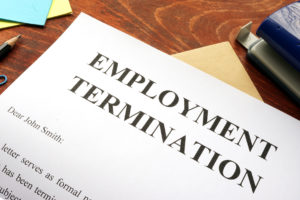Best Wrongful Termination Lawyer
Wrongful Termination Lawyer Near Me
Wrongful Termination
Under law, employees may not be terminated for discriminatory reasons or in retaliation for exercising their legal rights. A related concept is constructive discharge in which an employee feels no choice but to resign from employment for reasons that result from the employer’s violation of the employee’s legal rights.
Examples of Wrongful Termination:
Awards & Media
Testimonials
Our Law Offices
California
Texas
Contact Us Today For A Free Employment Law – Wrongful Termination Consulation
Cities We Serve
Practice Areas
Law Practice Areas
States & Cities We Serve
Most Popular Practice Areas
Employment Lawyer FAQs

Average Wrongful Termination Settlement
Wrongful Termination Settlement Payout Amounts There are many factors that determine the amount of a settlement. Generally speaking, wrongful termination settlements include past lost wages, future lost wages (after the termination until you find another comparable job) and losses you sustained due to emotional distress. Settlements also depend on the strength of the facts and whether the employer is able to pay. Settlements tend to be more valuable when the wrongfully terminated employee has a higher hourly income or salary. Each situation, however, should be evaluated based on its own merits to determine potential case value. Importantly, additional violations may be found that could enhance the value of the case including wage violations. For instance, if an employer did not pay overtime pay for overtime hours worked or failed to provide meal and rest breaks.

Can A Company Fire You For No Reason?
The short answer is yes. In California employment is considered to be “at will” which means that you can be fired at any time with or without cause. There are some exceptions to this general rule, however. You cannot be fired based on a discriminatory reason. For example, you cannot be fired based on your age (over 40) or your religion, or because you have a physical disability or because of your gender or sexual orientation or because you are a member of certain other protected statuses. You also cannot be fired for asking to be paid your earned wages or for other reasons such as taking medical leave if you qualify under the Family Medical Leave Act for job protection.

Can I Sue For Wrongful Termination?
Yes, you can. In California the law protects employees from being wrongfully terminated based on being a member of a protected class. It is illegal to terminate someone based on race, age (over 40), religion, ethnic origin, ancestry, gender, sexual orientation, gender identity, physical disability, mental disability, military or veteran status, and medical condition such as cancer or certain other conditions. You can sue for wrongful termination based on a violation of any law that protects the public and is considered to be a public policy of the State of California including wage and hour law and discrimination law.

Can I sue my employer for firing me?
Yes you can in certain circumstances. In California the law protects employees from being wrongfully terminated based on being a member of a protected class. It is illegal to terminate someone based on race, age (over 40), religion, ethnic origin, ancestry, gender, sexual orientation, gender identity, physical disability, mental disability, military or veteran status, and medical condition such as cancer or certain other conditions. You can sue for wrongful termination based on a violation of any law that protects the public and is considered to be a public policy of the State of California including wage and hour law and discrimination law.

Can You Be Fired Over The Phone In California?
Is It Illegal To Get Fired Over The Phone? Yes, you can be terminated over the phone. In California, employment is considered to be “at will”. This means that an employer can hire you or terminate you at any time. The “at will” doctrine also gives you the right to take a job or to quit a job at any time as well. An employer can let you know that you have been terminated over the phone, in person or by letter, text or email as well.

Terminated Vs Fired
Does Terminated Mean Fired? Generally speaking, terminated means the same as fired. It means the employer decided to let you go from your job. In some circumstances an employer may use the term “terminated” to mean either that the employer ended the work relationship, or it can mean that the employee ended or terminated the relationship. In these circumstances, the employer usually provides a definition for the term “termination.” Normally though if someone is terminated it means the employer made the decision to end your employment with the company.

How Long Does A Wrongful Termination Case Take?
How Long Can It Take To Settle? Wrongful termination cases can take a year or more to resolve. However, many cases settle much quicker including some that settle within a few months. Generally, though, most cases settle somewhere between 6 to 10 months after filing with the court.

How To File For Wrongful Termination?
If you want to file a wrongful termination case, you should first consult with an attorney to go over the facts of your situation to see if you have a solid case for wrongful termination. Keep in mind that in California, wrongful termination in violation of public policy requires a violation of a wage and hour or discrimination statute, for example. Your attorney can advise you on whether your facts will support a wrongful termination claim. For example, if you were fired based on having a physical disability or because you are transgender or because you are pregnant you may have a good wrongful termination case. Your attorney can help you to file a complaint in court (after obtaining the Right to Sue notice from the Department of Fair Employment and Housing if you have discrimination case).

How To Prove Wrongful Termination
Proving Wrongful Termination You must show that you were terminated based on an illegal reason. In a wrongful termination matter you have to show you were terminated because of your status such as being physically disabled or because of your religion or your gender or pregnancy or another protected status. Or, you need to show you were terminated because you asked for payment of your wages or other wage and hour rights. You can prove your case in a wage and hour case often with your own testimony plus your wage statements, schedules, texts between you and the employer or other evidence such as time punch cards. In discrimination cases you can testify about statements that were made to you or others about your disability for example. Or you can use a pattern of behavior as evidence such as all workers over 40 were terminated while all younger workers kept their jobs. There are many ways to prove a case. Your lawyer will help you by evaluating and presenting the evidence.
